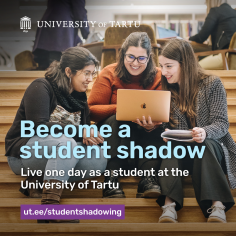Entrepreneurship in Economic Policymaking
Master's
2 January
15 March
30 April
9 February
- Become an innovative and entrepreneurial public sector specialist and leader with modern economic knowledge.
- Learn to shape economic policy in the fast-growing digital age.
- The University of Tartu belongs to the top 350 universities in the world (see Rankings and Surveys).
- Flexible studies allow you to combine work and university life.
- Study at the University of Tartu Delta Centre, which brings together a vibrant community of students, researchers and innovators in computer science, business and economics, mathematics and statistics.
You will gain diverse knowledge of economic development, management, politics, and international trends and strong analytical skills to shape local, national, and global policies. You can focus on addressing the effects of economic policies by integrating this knowledge into related areas (e.g. cyber security, etc.).
A special feature of the curriculum is teaching the economic view on the one hand and entrepreneurship (startup thinking) on the other.
In addition to field-specific knowledge, emphasis is also placed on cross-disciplinary knowledge, such as distinguishing between the important and the non-essential or strategic and conceptual thinking, good negotiation and conflict management skills, innovation, etc.
The lecturers of the University of Tartu School of Economics and Business Administration and several practitioners are included in the programme as lecturers. In addition, there is cooperation with various university departments, agencies and organisations (Johan Skytte Institute of Political Studies, Estonian Centre for Applied Research CentAR, Ministry of Finance, Estonian Business and Innovation Agency, Ministry of Economic Affairs and Communications, Ministry of Education and Research, Ministry of Rural Affairs, etc.).
You will learn to shape economic policy in the digital age during your studies and pass several exciting courses. Courses will cover e-Estonia success stories, technological and digital solutions and cyber security.
Studying is flexible and allows you to reconcile work and university life.
Learning outcomes
In this master's programme, you will gain the skills to analyse economic policies and evaluate and manage complex programmes effectively. You will be equipped to tackle intricate challenges, formulate appropriate local, state, and global policies, and provide solutions that align with economic considerations.
You will develop a deep understanding of economic developments, policies, international trends, and the governance of smaller countries. This knowledge will enable you to identify and leverage technological opportunities to address complex issues.
Furthermore, you will explore the principles of entrepreneurship and leadership within the public sector, learning from real-world experiences. Throughout the programme, you will have the chance to network with technology companies and collaborate with scientists across various fields, including medicine, IT, robotics, and environmental science.
Extracurricular activities
In addition to the study programme, you can join several practical programmes to support your development, grow your network and learn from international mentors worldwide.
- CDL (Creative Destruction LAB, read more here) brings together experienced founders of unicorns, and together with world-leading experts, you will help scale innovations underpinned by the digitisation of human societies. As a student, you can gain valuable insights from the leading experts and startup ecosystem.
- Wharton Global Course (read more here) is a collaboration programme between the University of Tartu, the Wharton School of the University of Pennsylvania and the Stockholm School of Economics in Riga. You will explore more deeply how these nations have transformed their economies and policies by prioritising digital innovation, entrepreneurship and technology commercialisation. Students will also gain insight into the startup supporting ecosystems in these nations, and how these contribute to country-specific approaches to building and scaling new technology ventures.
Programme highlights in video
- Watch the programme director talk about the master's programme in Entrepreneurship in Economic Policymaking during Virtual Open Day 2024.
- Watch the presentation about International master's admissions by the Head of International Admissions during Virtual Open Day 2024.
- Watch the programme director talk about the master's programme in Entrepreneurship in Economic Policymaking and the discussion round of master's students in the economics and mathematics field during the Online Open Doors Week 2022.
- Watch Challenges, opportunities and entrepreneurship in the public sector by Industry Professor Ott Pärna.
- Get to know the School of Economics and Business Administration.
Curriculum version:
More info: Study Information System
School of Economics and Business Administration
The School of Economics and Business Administration is part of the Faculty of Social Sciences, with a history of more than 75 years of teaching business and economics. It has a leading role in Estonian economic and business education with internationally qualified and experienced staff.
The School of Economics and Business Administration is Estonia's top research centre in economics, international business and management. The school aims to provide a vibrant research environment linked to international centres of excellence and produces high-level academic and policy-relevant economic analysis.
Read more about the School of Economics and Business Administration here.
Teaching staff of the Entrepreneurship for Economic Policymaking master's programme
|
Image
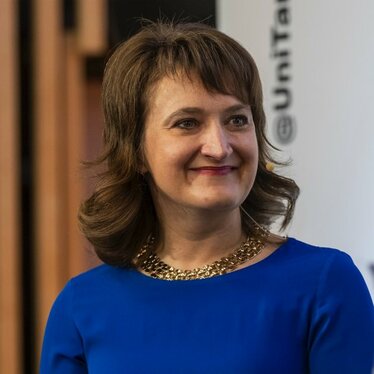
| Kadri Ukrainski Programme Director, Vice-Head of Research & Professor of Research and Innovation Policy, University of Tartu, Co-Site Lead, CDL-Estonia |
|
Image

| Ott Pärna Head of Development & Industry Professor, University of Tartu, CEO of Healthy Lifestyle Social Enterprise SCULT.org |
|
Image

| Bradley Loewen PhD, Marie Curie Individual Fellow, PeripheRIS, Eurac Research, Postdoc, Norwegian Centre for Energy Transition Strategies, NTNU |
|
Image
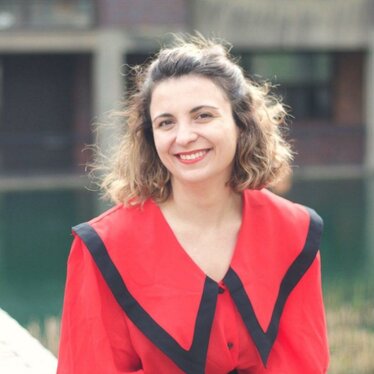
| Nino Kokashvili Manager, Infrastructure Advisory Group, KPMG UK |
|
Image
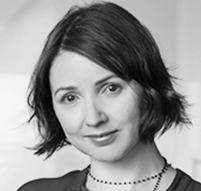
| Eneken Tikk PhD, Power and Influence Studies at the Cyber Policy Institute (CPI) in Jyväskylä, Security Policy, Regulation and Partnerships at Meta and Advisor on international peace and security issues in the context of ICTs |
|
Image

| Oleksandr Dorokhov Visiting Professor at Delta Management School, University of Tartu |
|
Image

| Tõnis Tänav PhD, Head of R&D at Republic of Estonia Ministry of Rural Affairs |
|
Image

| Rainer Saks Member Of The Management Board at CybExer Technologies, Former Head of the Foreign Intelligence Service & Chancellor of the Ministry of Foreign Affairs of the Republic of Estonia |
|
Image

| Tarmo Puolokainen PhD, Head of Analysis and Planning Department at Swedbank Estonia |
|
Image

| Maryna Tverdostup PhD, Economist, Vienna Institute for International Economic Studies |
|
Image

| Andres Kütt MSc from MIT, Expert at the Cyber4Dev, CTO at Jio, Board Member of Tallinn University and The Estonian Cooperation Assembly |
|
Image
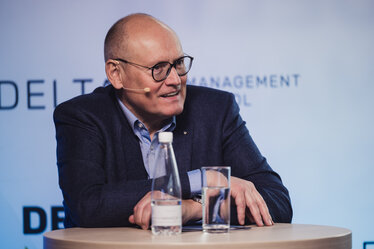
| Raivo Vare Politician, Entrepreneur, and Transit and Economic Expert, the first Estonian State Minister |
|
Image

| Rain Ottis Professor of Cyber Operations at Tallinn University of Technology |
|
Image

| Kristjan Vassil Professor and Former Vice-Rector of Research at the University of Tartu, Board Member at the University of Tartu Hospital, CDL-Estonia Chief Scientist |
|
Image
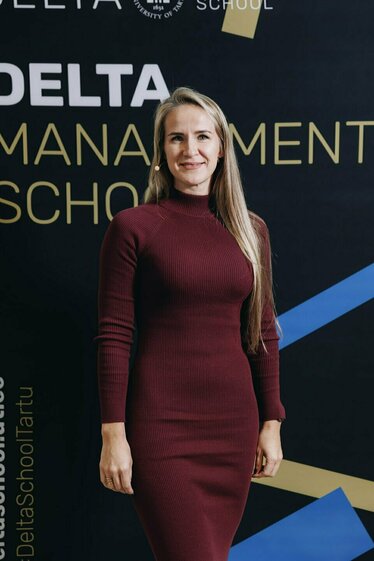
| Sirli Heinsoo Director of Digital Economy Department, Ministry of Economic Affairs and Communications of Estonia |
|
Image
| Stefano Brahgiroli Associate Professor of European Studies and Programme Director at the University of Tartu |
Winfried Pohlmeier Professor at Universities of Konstanz and Zeppelin, Former Vice-Rector of Research & Young Researchers at the University of Konstanz |
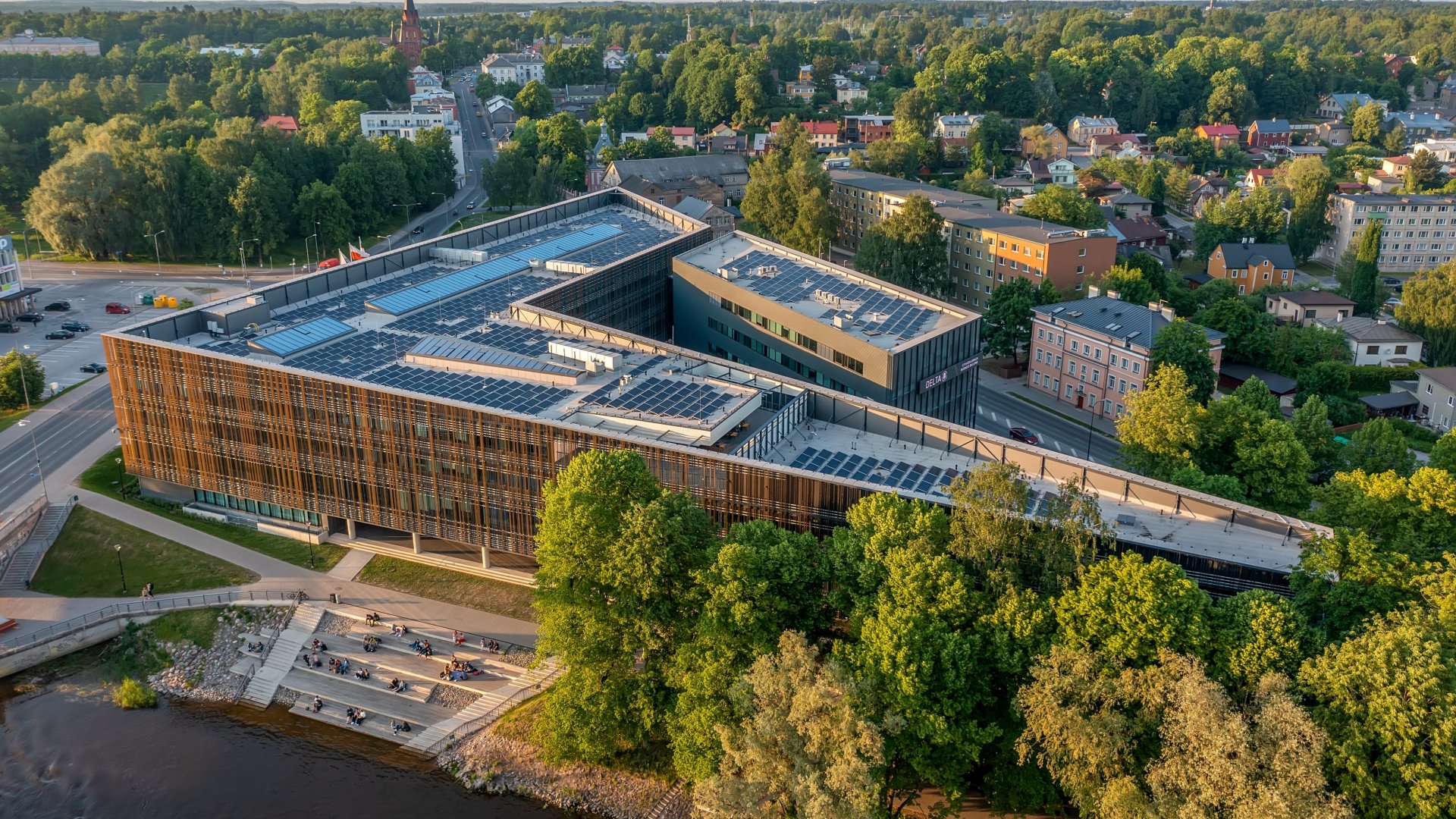
The studies take place at the University of Tartu Delta Centre. Opened in 2020, the Delta Centre comprises academic and research and entrepreneurship buildings and brings together more than 3000 students, lecturers, researchers, and company development employees.
The academic and research building accommodates the Institute of Computer Sciences, the Institute of Mathematics and Statistics, the Faculty of Economics and Business Administration, the Centre for Entrepreneurship and Innovation and some laboratories of the Institute of Technology.
As a graduate, you are an innovative and entrepreneurial public sector specialist with modern economic knowledge, able to cope successfully in a changing economic environment and society, taking into account different future work skills. You are a professional in your field.
Admission requirements for Entrepreneurship in Economic Policymaking
Required qualification:
1) bachelor´s degree or equivalent qualification in economics and business, and at least 5 years of professional experience, or
2) master´s degree or equivalent qualification in economics and business, or
3) other bachelor´s or master´s degree, and at least 5 years of professional experience in a programme related field, where advance knowledge of economic policymaking is required.The degree must be obtained by the application deadline. For assessment of professional experience, you are required to upload your CV.
Please see our country-specific document requirements.- English language proficiency – please see our acceptable tests and exempt categories
NB! The restrictions for the citizens of the Russian Federation are specified here.
Applications are evaluated based on
- the score of the motivation letter (yields 70% of the final score)
- professional experience (yields 30% of the final score)
The motivation letter (3000-3500 characters with spaces, written in English) must be submitted with your online application by 15 March at the latest.
The motivation letter should explain the candidate's motives for starting master's studies and describe how the studies in this programme are related to the previous professional experience and career goals. The letter may point out specific fields that the candidate would like to concentrate on during the studies and which can be also implemented in candidate´s professional activities.
The motivation letter should contain the following aspects:
1) Explanation on which topics of the curriculum are related to the applicant´s previous activity in the field
2) How would completing the programme support applicant´s career and their enterprise/organization
3) If and what kind of challenges does the candidate see in their personal/professional development
Evaluation criteria for the motivation letter
- Reflection of previous activity in the field in the light of this study programme (max 30 points)
- Discussion on advancing the candidate´s career and their enterprise/organization (max 30 points)
- Critical reflection of applicant´s personal development (max 30 points)
- The skills of argumentation in written text (max 10 points)
The maximum score for the motivation letter is 100 points and the result is positive only if the applicant gains 51 points or more.
Professional experience will be evaluated based on the CV. The CV must be added to your online application by the application deadline.
Evaluation is based on the lenght of the working experience and its connection to the study programme
The maximum score for is 100 points and the result is positive only if the applicant gains 51 points or more.
Only those applicants who score 66 points or higher (out of 100) as a combined score from both the motivation letter and average grade of the previous study level, will be considered for admission.
For further information on assessing candidates´ academic performance and calculating admissions´ score see here.
How to apply
The following information applies to international students and Estonian students who graduated abroad:
The application system opens on 2 January and closes on 15 March. The following documents must be submitted electronically via DreamApply by 15 March:
- online application
- motivation letter
- official certified copy of the bachelor's diploma or its equivalent and Diploma Supplement (transcript) in the original language (must include description of the grading scale)
- official certified translation of the bachelor’s diploma and Diploma Supplement (transcript) into English. As certified translations we consider 1) official translations made by the issuing institution (university) bearing their original signature, stamp etc, or 2) translations certified by a sworn translator or notary
- if available, master's diploma or its equivalent and Diploma Supplement (transcript), and the official certified translations into English
- proof of English language proficiency in the original language and
- copy of the passport page stating the applicant’s personal particulars
- curriculum vitae. You will find an example form here.
- confirmation/receipt of application fee payment (if applicable). All international applicants are required to pay the application fee EUR 100, unless they have completed the previous study level in Estonia. An application will only be processed after the fee has been received by the UT.
Submitted applications can not be edited. It is only possible to upload new documents. Applicants will receive feedback and notifications through the DreamApply system to their e-mail. Incomplete applications or those submitted by e-mail will not be considered for admission.
Guide to submitting an electronic application on DreamApply.
NB: The University of Tartu has no official partnerships with agents or educational representatives. We strongly recommend applying directly to the university without the help of unauthorised third-party entities. Should you use such a service, please ensure that your application's contact information is your personal details (your e-mail, phone number, etc.).
The evaluation of applications will be made based on the electronic copies added to DreamApply. A general ranking list will be formed based on the electronically submitted applications, and admission results (including offers) will be announced to all applicants personally via DreamApply by 30 April at the latest. Admitted candidates are expected to accept or decline the offer in DreamApply in 7 days. If the decision is not communicated to UT via DreamApply by the stipulated deadline, UT reserves the right to withdraw the admission offer.
NB! It is not possible to postpone the beginning of studies to the next academic year.
Terms and conditions of the admission offer
Admission offers are conditional. This means that there are conditions in the offer which the applicant needs to fulfil in order to be admitted (e.g. sending application documents by post; obtaining the required level of education). If the conditions are not met, UT has the right to withdraw the offer. Also, UT reserves the right to withdraw or amend any offer or revoke the matriculation of a student, if it becomes evident that the application contains fraudulent information, the qualification does not provide access to the chosen study programme or the student is found to have omitted key information from the application. Should such circumstances occur, UT will not be liable for any material or immaterial loss which the student may suffer as a result.
Once the admission results have been announced, all admitted students are required to send the application documents by post to: Student Admissions, University of Tartu, Ülikooli 18-133, Tartu 50090, ESTONIA.
The documents are expected to be mailed only by those receiving the admission offer (unless instructed otherwise by the admissions staff). The documents must reach the university within 3 weeks from the announcement of the offer. If the application documents do not reach us by the deadline, the university has the right to withdraw the admission offer. Applicants will be informed when their documents have arrived.
Requirements for educational documents
All copies of educational documents (diplomas and Diploma Supplements/transcripts) must be officially certified. By certified we mean that the copies should bear an original signature and seal of the authority certifying that these are true copies of the original document(s). The copies can be certified either 1) by an authorised official of the issuing institution, or 2) by a notary, or 3) with an Apostille attached. NB! Country-specific requirements may also specify the way documents from certain countries must be certified.
Please note that UT does not accept simple copies made on the basis of already certified copies (primary copies are needed).
All admitted students are required to present their original qualification certificates upon arrival (unless these were sent directly from the issuing institution).
Paying the tuition fee (applicable to those receiving a fee-based study place offer)
- EU/EEA/Swiss citizens are required to pay the fee for the first semester once they arrive in Tartu (by 20 February at the latest after signing the fee contract, please read more here).
- Admitted students from other countries are required to pre-pay half of the first semester's tuition fee. The invoice along with the pre-payment deadline and payment details will be sent to applicants via DreamApply after they have accepted the admissions offer and the University has received the hard copies of the application documents. Second part of the fee is due on 20 February. NB! The official admission letter (necessary for visa application) will only be issued once the University of Tartu has received the pre-payment.
- By transferring the pre-payment to the university, you confirm that you have informed yourself about the process of the visa and temporary residence permit application and you are able to arrive in Estonia by the start of the semester. If you have any questions please contact studentvisasupport@ut.ee.
The official admission letter will be sent to admitted students electronically via DreamApply only after the admissions office has received and reviewed hard copies of the application documents, and received the tuition fee pre-payment (if a pre-payment was required, please see Step 3 for more details).
NB! The electronic admission letter is also sufficient for non-EU students for applying for visa/residence permit at an Estonian embassy.
Once the admission letter is issued, accepted students may proceed further with arranging their arrival.
Please note that the academic year for this programme starts in the spring semester, 9 February 2026.
All non-EU students should first consult information on the process of visa and temporary residence permit application to be sure, as where and when the relevant documents need to be applied. Note that housing at the UT dormitories can be applied during a limited period of time, unless specified otherwise on the website. For housing alternatives please find further information on Tartu Welcome Centre website.
Travel information can be found here.
Based upon common queries, the most important information has been summarised into a pre-arrival information website UT Getting Started.
Please note that this programme is also available online, and you can take courses without moving to Estonia.
Estonian applicants should apply via National Admission Information Systems (SAIS). Further information in Estonian is available here.
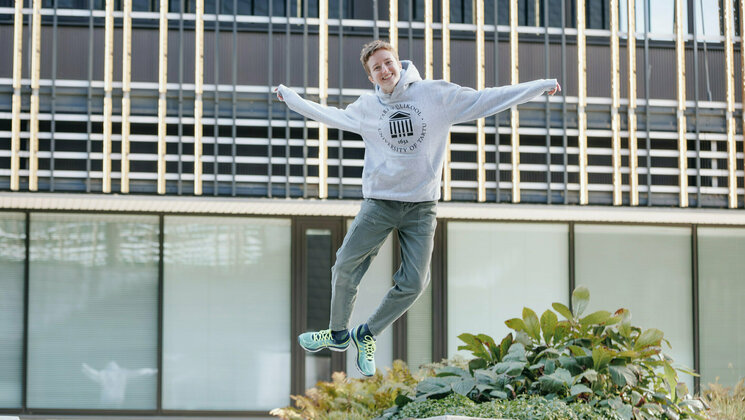
07.02.2025


